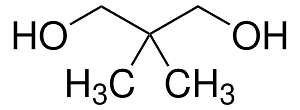Neopentyl Glycol

Product Description
Neopentyl glycol (NPG) is a chemical compound with various industrial applications.
Product:
Neopentyl Glycol
CAS:
126-30-7
Synonym:
2,2-Dimethyl-1,3-propanediol; Dimethylolpropane
Structure:

Typical Characteristics
Appearance
White crystalline solid
Boiling point
210 °C
Density
1.1 g/cm3
Melting point
127 °C
Molecular Weight
104.15
Purity
99%
Refractive index
1.4406
Uses, Applications & Markets
Key applications
get a quote
We Offer Neopentyl Glycol
in various grades
A few of the grades available are listed below:



Neopentyl Glycol used in many
industry applications
Neopentyl glycol (NPG) is a chemical compound with various industrial applications. Here are some of its industrial uses:
- Resins and Coatings: Neopentyl glycol is a key building block in the production of polyester resins and alkyd resins. These resins are used in the formulation of coatings, paints, adhesives, and sealants for various applications such as automotive finishes, architectural coatings, and industrial coatings.
- Plasticizers: It is utilized as a plasticizer in the production of flexible plastics and elastomers. Neopentyl glycol improves the flexibility, durability, and impact resistance of polymers such as polyvinyl chloride (PVC), polyethylene terephthalate (PET), and polyurethane (PU).
- Polyester Fibers: NPG is used in the production of polyester fibers and textiles. It serves as a crosslinking agent or chain extender in the polymerization of polyester fibers, enhancing their strength, resilience, and dimensional stability.
- Industrial Lubricants: It may be used as a lubricant additive or base oil in the formulation of industrial lubricants such as gear oils, hydraulic fluids, and metalworking fluids. Neopentyl glycol-based lubricants offer improved lubricity, thermal stability, and oxidation resistance.
- Plastic Packaging: Neopentyl glycol is used in the production of plastic packaging materials such as bottles, containers, and films. It contributes to the clarity, toughness, and chemical resistance of packaging plastics, making them suitable for food, beverage, and pharmaceutical packaging.
- Adhesives and Sealants: It is employed in the formulation of adhesives and sealants for bonding and sealing applications in construction, automotive, and electronics industries. Neopentyl glycol-based adhesives offer strong adhesion, weather resistance, and durability.
- Polyurethane Foams: NPG is used in the production of polyurethane foams as a chain extender or crosslinking agent. It helps control the cellular structure and mechanical properties of polyurethane foams, resulting in foams with improved resilience, thermal insulation, and load-bearing capacity.
- Antifreeze Agents: It may be used as a component in antifreeze and coolant formulations for automotive and industrial applications. Neopentyl glycol-based antifreeze solutions provide freeze protection and thermal stability, preventing engine damage and corrosion in cold climates.
- Fuel Additives: NPG derivatives are used as fuel additives to improve the performance and environmental properties of gasoline and diesel fuels. They may act as detergents, antioxidants, or octane boosters, enhancing fuel combustion efficiency and reducing emissions.
- Personal Care Products: Neopentyl glycol derivatives are used in personal care products such as cosmetics, skincare, and haircare formulations. They may serve as humectants, emollients, or viscosity modifiers, imparting moisturizing and conditioning properties to cosmetic products.